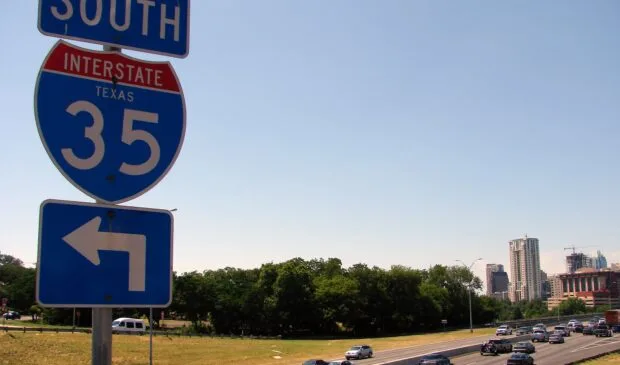
The Travis County Commissioners Court says the Texas Department of Transportation has ignored their concerns about the impact of Interstate 35 expansion on the health of Austin residents.
“We specifically asked TxDOT to do a number of important studies – environmental and air-quality studies – affecting public health. And they didn’t. They ignored them, basically,” Precinct 2 Commissioner Brigid Shea said.
Commissioners voted unanimously Tuesday to try again to get answers from TxDOT before the massive expansion through the middle of Austin begins in March 2024. They sent the first list of questions in February during the public comment period for the project.
In addition to repeating their request for studies, commissioners ask that TxDOT provide timely updates and adhere to public hearing rules from Capital Area Metropolitan Planning Organization, or CAMPO.
“All actions regarding this project … comply with CAMPO’s process for public hearings and a vote by the CAMPO policy board – not just administratively approved in a backroom somewhere,” Shea said. “And that any amendments or changes be fully transparent and held at CAMPO board meetings.”
As an example of an important health issue not addressed by TxDOT, Shea said the county wanted to know how much particulate matter this project will create.
“That’s the stuff that gets in your lungs and does long-term harm,” she said. “It’s a public health hazard, so EPA is setting that as a new standard. We asked TxDOT to look into that and they ignored it. They didn’t do that.”
TxDOT also ignored the county’s request for studies on greenhouse gas emissions for the life of the project and studies of pollutants in addition to carbon monoxide, Shea said.
“We asked them not to discharge rainwater runoff from the projects directly into Lady Bird Lake and the Colorado River downstream of Longhorn Dam,” Shea said. “They say they’re working with the city to possibly filter and treat the runoff, but no one can give us any real detail on that.”
Precinct 1 Commissioner Jeff Travillion, who seconded Shea’s motion, said I-35 expansion reminds him of the lasting damage the interstate did to Austin when it was originally built in 1962.
“The last time ‘urban renewal’ happened here we called it ‘urban removal,’” he said. “Because it went right in the middle of the African-American business community and destroyed institutions.”
Testifying in person Tuesday, Miriam Schoenfield from local organization Rethink35 said the expansion won’t solve the region’s transportation problems and adds unacceptable levels of traffic and greenhouse gases.
“TxDOT’s own numbers say that the expansion will result in the addition of about 100,000 cars driving into Austin every day,” she said. “Of course, they won’t just be on the highway. So it’s going to make any other form of transportation more difficult.”
Heyden Walker, representing Reconnect Austin, said she is unhappy with TxDOT’s response to Travis County.
“There were a lot of really important concerns outlined in that letter,” she said. “I think a lot of us here are disappointed that TxDOT seems to have ignored it almost entirely.”
Adam Greenfield, president of Rethink35, said commissioners were “absolutely right to insist on these things.”
“A City Council member recently called I-35 one of the greatest mistakes in this city’s history, in this region’s history. This is really a generational turning point right now,” he said.
Photo made available through a Creative Commons license.
The Austin Monitor’s work is made possible by donations from the community. Though our reporting covers donors from time to time, we are careful to keep business and editorial efforts separate while maintaining transparency. A complete list of donors is available here, and our code of ethics is explained here.



